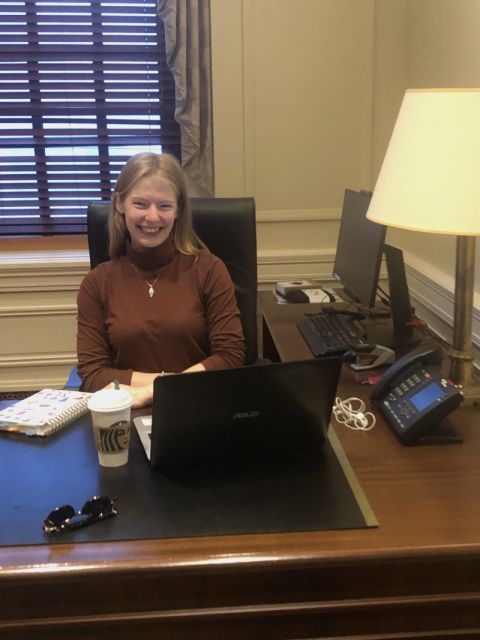
There has been a long-standing gap in the justice system for Ontario residents dealing with family law issues but unable to afford a lawyer and surpassing the income threshold to qualify for legal aid. Lena MacNicholas, Law’21, is part of a solution to address that gap. She is one of eight students selected by Pro Bono Students Canada (PBSC) to participate in its new remote Family Justice Centre (FJC).
Launched last September by PBSC, with Legal Aid Ontario (LAO) and Epstein Cole LLP, the FJC hosts virtual law clinics and develops public legal education resources for people representing themselves in family law proceedings. Through the online clinics, family law lawyers supervise upper-year law students who provide legal services to self-represented litigants.
“I was so excited to participate in the inaugural year of the project,” MacNicholas says. “It felt like the perfect opportunity to contribute everything I had just learned at a really crucial time.”
The timing was right for MacNicholas because she was already experienced in the area working with the Queen’s Family Law Clinic (QFLC). In the 2020-2021 academic year, she had been a student caseworker and then was hired as a summer caseworker when the pandemic hit, and the clinic had to transition quickly to remote services. At the end of summer, QFLC Director Karla McGrath, LLM’13, recommended that she apply to PBSC to help develop the new remote version of its Family Law Project, the FJC.
Each FJC student was responsible for creating a different component of the clinic. “During the fall semester, I worked on creating a procedural and substantive student manual,” says MacNicholas. “I drafted the intake form and policies for how students would be meeting with clients and lawyers over Zoom and using technology such as Docusign to either commission remotely or to give instructions to rural clients without the technology on how to use their local services to do so.”
Students also worked on documents, including such court forms as child support applications. “I had the opportunity to work with a lawyer supervisor to draft a parenting agreement,” she says. “I found it a useful opportunity to use what I’d learned at the QFLC, especially in terms of navigating virtual services.”
Pro bono lawyers provided summary advice to clients. “Our supervising lawyers advised on issues, including parents withholding children due to COVID-19, how to deal with third-party agencies such as the Family Responsibility Office, and how to generally draft documents or seek assistance with more urgent issues, where document drafting assistance from FJC is not possible,” she explains.
During the winter semester, MacNicholas and fellow FJC students dealt with clients during clinic shifts by doing client intake and worked with their supervising lawyers to facilitate communication with clients, draft documents, and do any other tasks that came up.
The need for the family law bar to address access to justice issues facing self-represented litigants was identified in the “Family Legal Services Review” written by the Honourable Annemarie Bonkalo, Law’76, former Chief Justice of the Ontario Court of Justice, in 2016 for the Attorney General of Ontario and to the Law Society of Upper Canada.
COVID-19 magnified the inequity in access to justice in more ways than court closures causing backlogs and job and/or income losses resulting in people being unable to pay for legal services.
“The pandemic has exacerbated some of the issues that we might not always realize have an impact on accessing justice,” says MacNicholas. “A lot of our clients rely on essential public services like transportation, social workers, or just other people in their personal network to access the legal system (our clinics) and just to generally navigate their lives. The current situation creates a huge obstacle to using these services as many clients are also at risk or are caregivers for someone who is. Also, for a lot of clients, it has lengthened and/or increased the confusion of an already long and confusing situation.”
In addition, she notes the pandemic situation requires access to digital resources and some degree of digital literacy. “Being able to help people navigate this situation and have a hand in structuring it to be as ‘user-friendly’ as possible was incredibly rewarding,” she says. “I also really enjoyed the team of people that I was with, despite never being able to be in the same room with them!”
For MacNicholas, her time at the FJC is the latest demonstration of her interest in family law. In addition to working with the QFLC, she shadowed Kingston lawyer Christina Rorabeck, Law’04, in first year (“I got to watch her act as duty counsel in Family Court”), participated in the Walsh Family Law Moot earlier this semester, and will be articling with Toronto’s Epstein Cole in August, the firm sponsoring both the Walsh Moot and the Family Justice Centre.